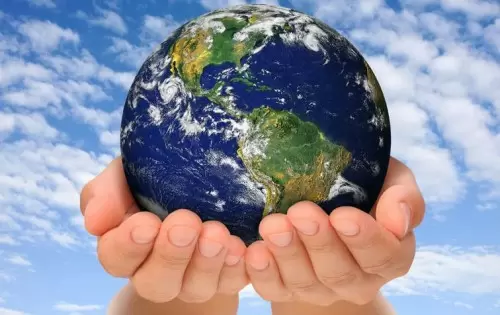It's the largest estuary in the United States and arguably one of the most magnificent-the Chesapeake Bay.
With its home in Virginia and Maryland, and its watershed winding through no less than six states, including Washington D.C., the Chesapeake Bay covers more than 4,500 square miles and includes the Potomac, York, James, Susquehanna, and Rappahannock Rivers, not to mention about 100,000 tributaries. Still not impressed? This water system is home to more than 3,600 species of plants and animals and more than 17 million people.
So, in terms of its significance to Virginia's environment, you'd be hard pressed to find anything that tops it. Its profoundly complex, fragile ecosystem is affected by everything from climate change to agriculture to increases in population, and even the smallest fluctuations to the Bay's environment can have extensive, long-lasting repercussions that affect us all, whether we live along it, rely on it for our livelihood, or make the journey to its beaches for a well-deserved summer holiday.
Virginia's environmental efforts focused on the Chesapeake Bay are abundant and multifaceted, with everyone from nonprofit organizations to governmental agencies recognizing that the health of this estuary is vital to the health of the environment and the people who call this region home.
Armed with the right education, you can become an environmental scientist and join this movement to restore and protect the delicate environment of the Chesapeake Bay. Whether you study the bay's nutrient and sediment pollution issues, oyster reef restoration efforts, or agricultural best management practices, your work will be used to educate, inform, and create legislation that will protect Virginia's environment for current and future generations.
What Can I Do with an Environmental Science Degree in Virginia
Whether you focus your efforts on the Chesapeake Bay or on other issues aimed at habitat loss, development, pollution, or climate change throughout Virginia, from its peaks to its shores, your expertise in environmental science will be valued by everyone from governmental agencies to private environmental consulting firms to grassroots nonprofits.
In state government, the Virginia Department of Environmental Quality oversees state and federal laws aimed at air and water quality, water supply, and land protection. It also works alongside businesses, communities, and educators to enhance the quality of the environment and support sustainability efforts.
Other state agencies aimed at sustainability and conservation include the Virginia Department of Agriculture and Consumer Services, the Virginia Department of Conservation and Recreation, the Department of Forestry, the Department of Mines, Minerals and Energy, and the Marine Resources Commission.
Within the nonprofit sector, the Virginia Conservation Network (VCN) is a leader, partnering with more than 100 Network Partners to create one voice for the conservation community throughout the Commonwealth. VCN currently oversees a multitude of beneficial programs, including the Clean Water Coalition, which advocates for clean water throughout the Chesapeake Bay Watershed.
Environment Virginia, a citizen-based environmental advocacy organization, is another big name in conservation in Virginia. This group engages in groundbreaking research affecting the environment and then uses the information to educate the public.
A career in environmental science in Virginia is both fulfilling and lucrative. According to 2020 BLS statistics, environmental scientists and specialists in Virginia earned an average, annual salary of $87,360, while conservation scientists earned $72,920, and hydrologists earned $99,970.
2020 US Bureau of Labor Statistics salary figures and job growth projections for Environmental Scientists and Specialists, Conservation Scientists, and Hydrologists reflect state data not school-specific information. Conditions in your area may vary. Data accessed September 2021.
Master's in Environmental Science in Virginia
A career in environmental science comes with its share of unique professional opportunities that are often enhanced with the addition of a master's degree.
For example, the University of Virginia offers an MA/MS in Environmental Sciences, which offers a robust curriculum that includes specific training in ecology, hydrology, atmospheric science, and geoscience. You'll also enjoy opportunities to engage in research in a wide array of fields, including environmental biogeochemistry, coastal processes, catchment hydrology, wetlands ecology, terrestrial ecology, and more.
Virginia Tech also offers unique courses of graduate study in environmental science, including an Executive Masters of Natural Resources and a Global Masters of Natural Resources. These programs are offered through the university's Center for Leadership in Global Sustainability, which is ranked among the top in the nation to study natural resources and conservation.
Bachelor's in Environmental Science in Virginia
A bachelor's degree in environmental science provides students new to the field with a comprehensive introduction that prepares them for jobs in the private, public, and nonprofit sectors, as well as for graduate school.
You'll find a nice selection of bachelor's programs in environmental science in Virginia like the University of Virginia's BA/BS in Environmental Science and Hollins University's BA/BS in Environmental Studies/Environmental Science, both of which include excellent opportunities for research and experiential learning. For example, students of Hollins University enjoy outstanding study abroad opportunities where they can study and research Australia tropical rainforests, Cambodia and Vietnam river ecosystems, and Bhutan's Himalayan environment, just to name a few.
Online Environmental Science Degree Options from Schools in Virginia
Online learning is bigger and better than ever, with many colleges and universities now offering outstanding online degree programs to suit today's busy professionals or those with geographical limitations. In Virginia, online study in environmental science is available at both the undergraduate and graduate levels.
For example, Virginia Wesleyan's offers a BA in Environmental Studies that is offered entirely online. This program's design features a dynamic, online environment that includes easy access to your instructors and loads of collaboration and communication with your peers.
At the graduate level, Virginia Tech offers the online Masters of Natural Resources, which features online coursework and the completion of an international field experience. This blend of online and hands-on learning ensures a truly well-rounded, dynamic course of study. Just a few of the international learning opportunities are located in India, South Africa, Cuba, China, Egypt, and Morocco.







